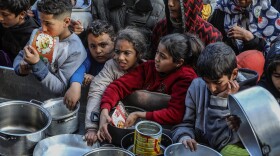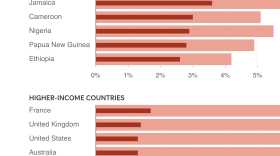
Nurith Aizenman
[Copyright 2024 NPR]
-
Frustrated when Brazil could not get COVID vaccines, two Brazilian doctors (who have been best friends since college) decided to invent their own version and offer up the patent essentially for free.
-
After initiation rites – including circumcision – the boys leave their families to take charge of the herds, driving them high into the mountains. It's a way of life that climate change is testing.
-
The modern study of starvation was sparked by the liberation of concentration camp survivors. U.S. and British soldiers rushed to feed them — and yet they sometimes perished.
-
A report out this week says hunger, malnutrition and even starvation are widespread in Gaza, but stopped short of declaring it a 'famine.' Here's a primer on what that means, and who gets to decide.
-
The World Health Organization has just released the latest worldwide statistics of the global burden of cancer. Here are five takeaways from WHO's top expert on cancer.
-
That's how a prominent medical ethicist describes a researcher's innovative plan to share study results with participants in Kenya.
-
In 2023, six nations were able to eliminate virtually all cases of at least one of the illnesses on the World Health Organization's priority list of "neglected tropical diseases."
-
The study focuses on a universal basic income and spans 12 years and thousands of people in Kenya. How did the money change lives? What's better: monthly payouts or a lump sum.
-
On an extinct volcano in Uganda, hundreds of thousands face disaster due to climate change. The charity GiveDirectly is trying a surprising approach to help them get out of harm's way.
-
In Kenya, someone with symptoms of dementia may not be able to get a diagnosis — leaving both patient and family with no idea of what is going on. A program is trying to change that.
-
Lower-income countries did not get the COVID vaccines they needed. So the World Bank and other partners tapped a South African company to cook up the (undisclosed) recipe for the Moderna mRNA vaccine.
-
The study assigned subjects to one of two rooms: 68 degrees or a sweat-inducing 86 degrees. They played a computer game that can bring out the worst in human nature. What are the real-world lessons?













